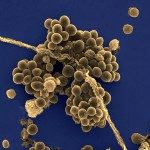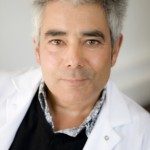Lien vers Pubmed [PMID] – 27703138
Nat Commun 2016 Oct;7:12944
The bacterial pathway for fatty acid biosynthesis, FASII, is a target for development of new anti-staphylococcal drugs. This strategy is based on previous reports indicating that self-synthesized fatty acids appear to be indispensable for Staphylococcus aureus growth and virulence, although other bacteria can use exogenous fatty acids to compensate FASII inhibition. Here we report that staphylococci can become resistant to the FASII-targeted inhibitor triclosan via high frequency mutations in fabD, one of the FASII genes. The fabD mutants can be conditional for FASII and not require exogenous fatty acids for normal growth, and can use diverse fatty acid combinations (including host fatty acids) when FASII is blocked. These mutants show cross-resistance to inhibitors of other FASII enzymes and are infectious in mice. Clinical isolates bearing fabD polymorphisms also bypass FASII inhibition. We propose that fatty acid-rich environments within the host, in the presence of FASII inhibitors, might favour the emergence of staphylococcal strains displaying resistance to multiple FASII inhibitors.


